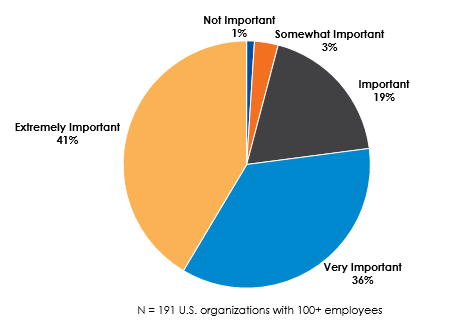Top Advantages of Managed Cloud-Based Data Backup
Securely backing up company information is crucial in ensuring that valuable data isn’t lost or compromised. While an organization can use internal resources for this task, in many cases a managed cloud engagement makes more sense. This post will discuss key advantages of using a managed services approach to provide cloud-based backup of corporate information.
Continuous backup
Companies know data backup is necessary. As shown in the chart below, 77% of organizations with 100 or more employees say that data protection is very or extremely important to their organization. Another 19% deem it “important.”

That said, companies don’t always perform data backup consistently. Using a managed cloud provider for backup, however, can provide continuous coverage for all applications, files, records, settings, and other data within your business. Cloud backup services complement any in-house efforts to back up IT systems.
Effective backup
In addition to continuous backup, a managed services provider can deliver effective backup. In other words, they can ensure that files aren’t just duplicated consistently, but in a manner that preserves their original integrity. Their expertise in the area of data backup and security can be leveraged to guarantee that files are accurately and adequately copied.
Keypoint Intelligence-InfoTrends research shows that a wide range of providers are offering this kind of expertise, including security consultants, software companies, device manufacturers, office equipment dealers, and IT resellers.
Cost transparency
More and more companies are expecting straightforward and transparent pricing. Managed cloud services enable companies to know their costs upfront, helping them devise and adhere to IT budgets. Under the service agreement, if they use a certain amount of services and maintenance, they’ll pay a certain amount of money. This contrasts with transactional purchases where costs may be volatile or unclear until a certain stage in the purchasing process.
Fewer internal resources required
Using a managed cloud services provider for data backup means that organizations can devote their internal IT staff to other important pursuits. For instance, these employees can focus on IT support and developing customized productivity applications for the business. Smaller businesses in particular may find the added help lets them better concentrate on their day-to-day jobs. Furthermore, outsourcing backup services means that less time is required for training IT staff on the ins and outs of backup and recovery operations.
Greater flexibility
Managed services providers can quickly react to client requests for added backup capacity and capability. That’s because they have built out their IT infrastructure to excess capacity, knowing that at any time their customers may require more resources. Without a managed cloud arrangement, companies may need to purchase expensive servers, networks, and technical personnel to add backup bandwidth. Furthermore, they may feel they need to maintain a certain level of backup as a result of the investment. With managed backup, however, they can easily cut back on services as well.
The overwhelming majority of businesses acknowledge that data protection is very important or extremely important to their organization, even if they don’t always perform the appropriate level of data protection and backup.
A managed cloud services provider like Net at Work can deliver continuous, comprehensive, and secure backup through its robust technological infrastructure and expertise in the form of servers, networks, and technical personnel. In addition to expertise and capability, managed cloud services enables organizations to know their data backup costs ahead of time, scale backup services up or down as needed, and focus on their core areas of strength.



